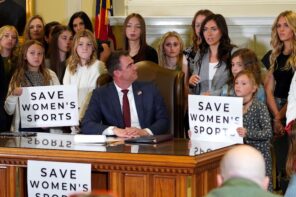At least, not “right” as in “opposed to government in principle.” As Guy Molyneux and Ruy Teixeira write at the Center for American Progress site, voters between the ages of 18 and 32 hold good (but necessarily “big”) government in significantly higher esteem than older cohorts. At first glance, that morsel of information seems downright soporific.
But for political junkies, among others, there is some significance here. As Molyneux and Teixeira point out, progressives trying to sell activist government programs are likely to find their most receptive audience among the millennials, as they’re known. Given that we have a more-or-less liberal administration at the moment, this also says good things about the political prospects for Democrats. Assuming they understand how to publicize their initiatives (not always a safe assumption), Dems may be able to create a loyal relationship with young voters that will last for decades. What happened during the Great Depression might happen again, in other words, and under unnervingly similar economic conditions.
The religious hook here is that, as we are often told, young evangelicals are in some ways quite a bit less conservative than their older peers. Though the overall evangelical vote hasn’t changed much in recent elections, Obama made significant gains among evangelical millennials in the 2008 cycle.
That’s important because at roughly one-quarter of the total population, evangelicals form an amazing electoral bloc. At the moment, they’re solidly Republican. Were they to switch to the Democratic side through generational change, it would spark the largest political realignment in America since, well, southern evangelicals became Republicans. Presumably, then, if Democrats were able to convince these young evangelicals that they’re not totally of the devil, it could result in some startling gains at the ballot box.
But holding up Molyneux and Teixeira’s hypothesis against the young-evangelical data leaves me with a question. Which approach is most likely to cement millenials firmly in the Democratic camp: outreach based on good government looking out for their economic interest, or on shared cultural values?
I’m tempted to go for the former approach for a variety of reasons. For one thing, simple math says that evangelical millennials, no matter how important a slice of the pie, are only just that: one slice. If good government appeals to them, as well as other young voters, why not push that?
For another, while younger evangelicals are more gay-friendly, there’s no meaningful gap between them and their elders on the question of abortion. That might drive a wedge between them and Democrats, or it might not. It’s too early to tell.
On the flip side, I understand that it might take more than one approach to reel in voting blocs. That is to say, if you want young evangelicals, you might have to convince them that government can work and that it’s not inimical to their values.
With that in mind, allow me to restate the question: should Democrats concentrate on macro-level appeals or micro-targeting of specific demographics? Like I say, I know what my answer would be, but of course I could be wrong about that. Anyone want to attempt talking me out of my position?




